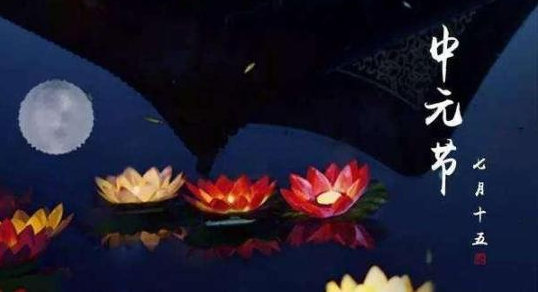(单词翻译:单击)
The Hungry Ghost Festival, also known as the Ghost Festival,
中元节,也被称为鬼节,
is celebrated either on the night of the 14th or the 15th day (depending on where you live in China), of the seventh month of the lunar year, known in the West as August.
是在农历7月(也就是西方的8月)的第14天或第15天(取决于你生活在中国的哪个地方)的晚上庆祝。
In other countries, which celebrate a similar festival, it is observed earlier or later.
在其他国家,也有类似的节日,但庆祝的时间或早或晚。
The Hungry Ghost Festival is the most important festival of the Hungry Ghost Month,
中元节是鬼月当中最重要的节日,
and on this day the dead are remembered and honoured, meals are prepared three times, plates and settings are put at the table for ancestors,
在这一天,生者会追思和祭祀亡者,并准备好三餐,装在盘子里,放到供奉祖先的桌案上,
and the feast at night is full of burning incense and joss paper.
晚上还会烧香和烧纸钱。
It is believed by Taoists and Buddhists alike that on the first day of the Hungry Ghost Month, the gates of heaven and hell are opened,
关于鬼月的第一天,道教和佛教说法相同,鬼门关会打开,
and one's ancestors, as well as restless, uncared for, and vengeful spirits walk the earth for the whole month until the gates close on the last day.
人们逝去的祖先,以及那些孤魂野鬼和冤魂们,整个鬼月都会在人世间游荡,直到鬼门关在最后一天关闭。
You may remember our video on the Qingming Festival, and be thinking what's the different about these two festivals?
你们也许会想起我们之前关于清明节的视频,并且会想,这两个节日有什么区别吗?
Well, where the Qingming is all about honoring your ancestors in the land of the dead,
清明节是人们去祭祀地府中的祖先们,
the Ghost Festival is when the ghosts actually come to the land of the living, and it's essential to appease them with offerings food and entertainment.
而中元节则是鬼魂来到人世间,所以用贡品,食物和款待来安抚它们是很必要的。

Although the exact origins of the festival are lost to time,
虽然这个节日的确切起源已经失传,
many of the attributes of the festival including respect for one's parents and ancient ancestors, and easing vengeful or wandering spirits, come from Buddhism,
但是这个节日的许多传统,包括对父母和祖先的尊重,以及对冤魂或孤魂野鬼的款待,都是出自佛教,
and specifically, the tale of Mulian, who rescues his mother from hell.
具体来说,是出自“目连救亡母出地狱”的故事。
The tale goes like this: after Mulian's mother dies, she goes to hell for her evil sins in life.
这段故事是这样的:目连的母亲在死后因为生前罪恶过重而下了地狱。
And when Mulian finds out, he seeks aid from Buddha.
当目连知道之后,他就向佛陀寻求帮助。
He is guided by Buddha who tells Mulian to offer monks and monasteries gifts and food on the 15th day of the seventh lunar month.
在佛陀的指引下,目连在农历七月十五日向僧侣和寺院献上贡品和食物。
And it would be his devotion to his mother which would allow her to leave hell and be reincarnated.
而正是目连对母亲的爱,才使得她最终得以离开地狱转世。
The dead are thought to be hungry, because they are spirits and cannot eat.
亡者通常会被人们认为是饥饿的,因为它们是鬼魂,不能吃东西。
But in the case of angry or restless ghosts, it's because they did not receive proper burial rites, or have been forgotten by their families.
但对于怨鬼来说,则是因为它们没有享受到应得的葬礼,或是被家人遗忘了。
By offering them food, however, they are fed by one's kindness and attention, and turn from hungry ghosts to happy ghosts.
不过要是给它们准备了食物,让它们也感受到人间的善良和关心,它们就会从饿鬼变成开心鬼。
Through the Taoist beliefs, we get the opening of hell's gates at the beginning of the seventh lunar month, and the closing of it on the last day.
根据道教的说法,鬼门关会在农历七月的第一天打开,在农历七月最后一天关闭。
"Hell" should not always be understood in a Christian sense, because the meaning of that word changes with its context in a sentence.
对于基督教来说,“地狱”这个词不好理解,因为这个词的含义会随着句子中的上下文而变化。
Sometimes it does refer to a place of punishment, sometimes it only means the land of the dead or the underworld.
有时候它指的是一个接受惩罚的地方,而有的时候,它仅仅是指地府或者地下世界。


